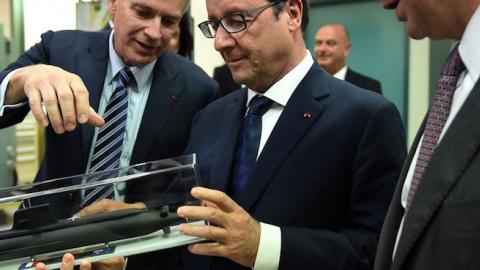In February, the government of Australian Prime Minister Malcolm Turnbull reaffirmed in a defense white paper the country's intention to build a fleet of 12 new submarines over the next 20 years with capabilities that would make them the most advanced conventional submarines in the region. The estimated $40 billion project would be the biggest and most complex defense program ever undertaken by Canberra.
Australia's existing fleet of Collins-class submarines was designed and built domestically. With the decision to replace the aging subs, foreign companies were invited for the first time to bid for the contract. Consortia led by Japan's Mitsubishi Heavy Industries, France's DCNS and Germany's ThyssenKrupp Marine Systems are now undergoing a "competitive evaluation process." With the winner due to be announced by the end of June, all three groups are stepping up public campaigns to support their bids, and some to criticize their competitors.
The latest verbal volley was fired by DCNS on March 17. Herve Guillou, the group's chairman and chief executive, told Australian media in Paris that if Canberra chose a Japanese contractor, it would antagonize China and fuel Sino-Japanese rivalry. If war ever broke out between the two countries, Australia might even be drawn into the conflict, he warned. If Australia wanted to increase the prospects for regional peace and stability, Guillou suggested, it would be wiser to choose a European partner.
The aim of Canberra's competitive evaluation process is to secure the best capabilities for Australia's requirements at the best price, while producing added benefits such as creating jobs and transferring technology. Although these requirements will largely determine the winner, Canberra has also indicated it will take strategic considerations into account.
With his recent remarks, Guillou was clearly trying to counter the common assumption that Japan would be the best strategic option. Although the competing groups can be expected to make self-serving comments, Guillou's warnings are likely to be dismissed by Australian officials and may even harm the prospects of DCNS, if they are seen to reflect a poor appreciation of the evolving strategic landscape in East Asia.
HOLLOW REASONING
Unpack the DCNS argument and it immediately begins to unravel. Start with the charge that partnering with Japan will antagonize China. It probably will. But is that relevant? Canberra's decision to build 12 of the most advanced conventional submarines in the region has already displeased the Chinese.
As the government's white paper indicates, Australia is deeply concerned about China's naval activities in the hotly contested South China Sea. Preparing for possible instability in Southeast Asian waters is a large part of the rationale for the submarine program. Who is Australia worried about? It is not the other territorial claimants in the South China Sea -- the Philippines, Vietnam, Taiwan, Malaysia or Brunei. That leaves China. It is no wonder that China was the only Asian country to express dissatisfaction with the white paper.
Ultimately, if Australia wants the best submarines for its requirements, it cannot be swayed to abandon that criterion simply because of Chinese disapproval. Beijing is not a security ally or security partner. True, China is Australia's largest trading partner -- as it is for Japan and many Southeast Asian states. But almost all the region's countries, including major Chinese trading partners such as Japan, Singapore, Malaysia, Vietnam, the Philippines and India, share Australian strategic anxieties about China and are beefing up their militaries and improving cooperation with each other to counter Beijing. Australia is hardly alone in making security decisions that are bound to enrage Beijing. And in any event, Beijing already expects Australia to choose Japan as the winner of the bid.
What about the argument that choosing Japan will embroil Australia in Northeast Asian strategic rivalry? Curiously, Guillou pointed out that Japan is already a strategic partner for Australia whether Japan's MHI wins the bid or not. So why not choose a French company instead? If that is the case, then DCNS has acknowledged that Canberra has already taken strategic sides.
In the end, Guillou's stance appears to miss the point that when it comes to Canberra's regional priorities, maintaining free and open access to sea-lines-of-communication is a vital national security concern, as it is for all trading economies. In Australia's eyes, action by any country that appears to threaten guaranteed maritime access or to reject international laws such as the United Nations Convention on the Law of the Sea is to be resisted.
PICK A SIDE
This is why China is already a target of frequent Australian criticism. It is not growing Chinese power that is of primary concern, but the way a powerful China is using its strength, such as refusing to justify its territorial claims or submit them to international arbitration, continuing a major artificial island building program in contested areas, and taking steps to militarize these artificial islands by putting missiles on at least one of them. Since China claims some 90% of the South China Sea, how China uses its power is not a trivial matter. The point is that Australia is already committed to taking sides against China so long as such policies continue.
Even then, the argument that Australia may be dragged into a Sino-Japanese war if Japan wins the bid does not make any sense. It is true that Australia and Japan will automatically elevate their security partnership to an unprecedented level if MHI wins the bid. But it will not make them allies with defense commitments to each other, just as a win by DCNS would not impose any obligation on Canberra to assist France militarily if the latter were at war. To argue otherwise is patently absurd.
Finally, much of the region is hoping that Japan wins the bid if enthusiasm for a deeper Australia-Japan security relationship, clearly evident in regional meetings such as the Shangri-La Dialogue in Singapore, is anything to go by. Why? Because if MHI wins, it would strengthen U.S.-Japan-Australia cooperation for decades to come -- not least because the new Australian submarines would be fitted with American weapons systems. Just as the U.S.-led security architecture has been the backbone of stability for decades, that architecture needs to be strengthened and adapted to create disincentives for China to behave ever more assertively. Closer cooperation between the U.S. and its two most powerful naval allies in Asia would achieve just that.
A successful Japanese bid would also smooth the way for Japan to sell military technology to other like-minded countries in East Asia, which has been made easier by Tokyo's recent passing of security legislation. That would increase the defense capabilities of the Philippines, Vietnam, Malaysia, Singapore and India, all of which are seen as interested in procuring what Japan might have to offer. Although the region was once intent on limiting defense spending in the aftermath of the Cold War, China's activities in the South China Sea have changed all that. The better these countries are able to defend their immediate maritime periphery and interests, the more complicated for Beijing to push the envelope.
The desperation of France, Germany and Japan to win the region's most lucrative defense contract is increasing, and understandably so. Japan is promising to hold nothing back and offer its top-secret submarine technology to Australia. Germany is promising to create submarine schools and design centers in Adelaide to create local employment. The competing parties will maximize their chances of winning by meeting the tendering criteria, and not by alarmist words and arguments that will likely annoy Australian officials.
















